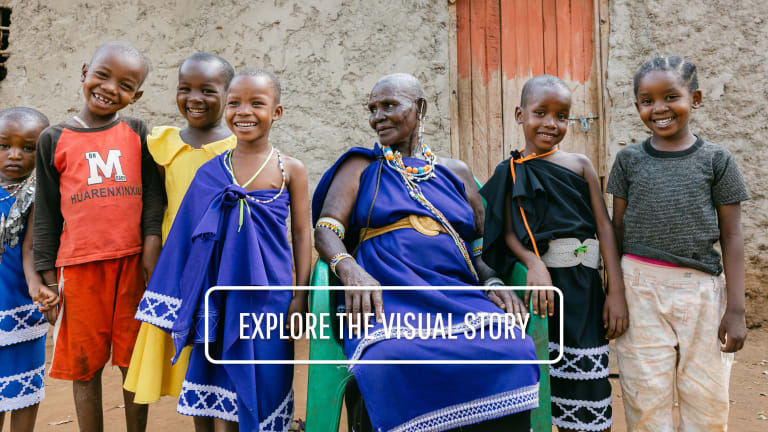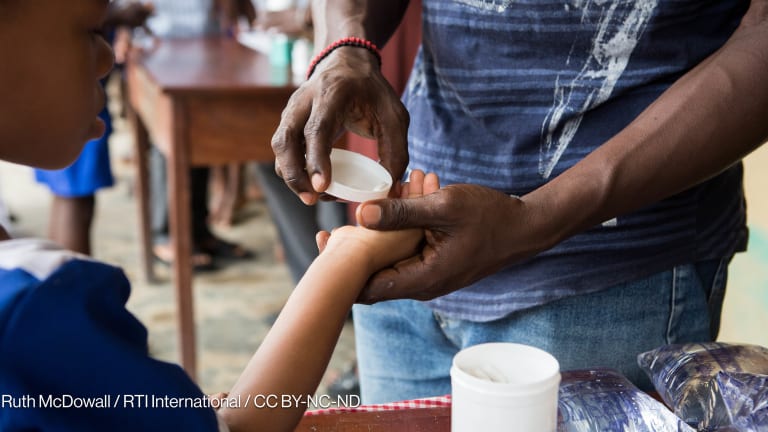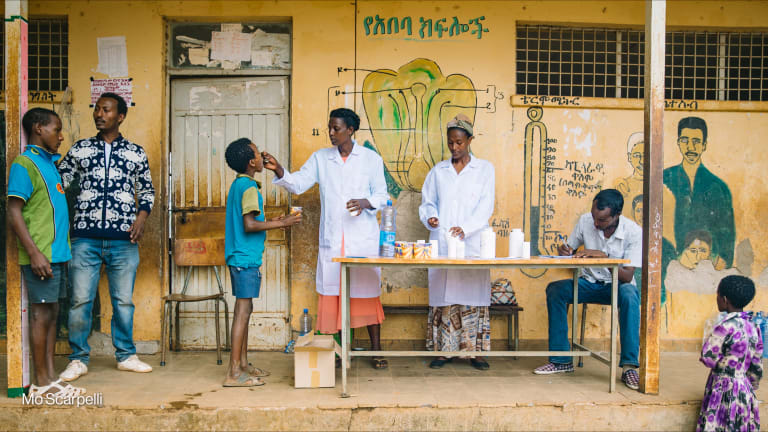
After a peak in funding in 2018, research and development funding for neglected tropical diseases, or NTDs, has declined.
The arrival of SARS-CoV-2, better known as COVID-19, captured attention and shifted priorities. “When COVID hit, there was an immediate concern about de-prioritization of investment in other health areas, and I don't think we saw it immediately,” explained Jamie Nishi, CEO of the American Society of Tropical Medicine and Hygiene. “Now that we are a few years after the peak of the pandemic, we are starting to see that decline in funding [in NTD research].”
However, the pandemic also saw an increase in funding dedicated to health. In 2019, at the onset of COVID-19, $43.1 billion was spent on development health assistance worldwide. By 2020 and 2021, $1.8 billion was contributed toward pandemic preparedness in low- and middle-income countries, while $37.8 billion was provided for health-related COVID-19 response.
As a result, global funding for basic research and product development for neglected diseases in 2022 witnessed a 10% drop from the previous year. Most individual NTD disease areas saw reductions in funding that same year, with several — including Mycobacterium ulcerans (Buruli ulcer) and Chlamydia trachomatis infections (trachoma) — experiencing record lows.
The bigger picture
Funding NTDs is complex. Unlike other high-profile diseases or intervention programs that have pooled funding mechanisms, NTD programs have diverse and often one-disease siloed international donors — making it difficult to build an integrated picture of the global financing situation for NTDs.
The World Health Organization’s global NTD program faces its own financing difficulties, reflecting broader trends and signaling a shift in the global health landscape.
Since the onset of COVID-19, the program has faced funding withdrawals or cuts from several major donors, which continue to cause severe budget restrictions and have led to a significant reduction in the workforce.

And in 2022, the U.K. government terminated its Accelerating the Sustainable Control and Elimination of Neglected Tropical Diseases, or ASCEND, program following a £4 billion cut to the foreign aid budget. The end of the U.K.’s program was a harbinger for other countries looking to mitigate the impact of the financial crisis.
Slow and steady
Combating NTDs, as an aspirational strategy, now includes 21 diseases caused by a variety of pathogens — grouped together primarily because they are neglected in the eyes of the global health community.
Over five decades, the NTD movement has seen its share of successes — the virtual elimination of dracunculiasis, or Guinea worm disease, for one — and failures, such as the cutaneous and visceral leishmaniasis outbreaks arising from conflicts. Today’s funding crunch is nothing new for the movement.
“Even between 2011 and 2020, the level of funding for NTDs was very limited and relied on few organizations, donor countries, philanthropies, and champions among endemic countries,” explained Julien Potet, neglected tropical disease policy adviser at Médecins Sans Frontières.

In the post-pandemic era, the question becomes how to show relevance amid a shifting global health landscape, explained Sam Mayer, vice president of global strategic partnerships at the END Fund, a vehicle for collaborative private philosophic investment. “On the current trajectory, with the same organizations doing the same types of things, we won't get there anywhere near as fast as we need to, certainly not fast enough to meet WHO’s 2030 road map targets for NTDs,” he said.
There is a consensus that increased mobilization of resources from both partners and donors, as well as domestic national budgets, are key factors in reaching those targets.
The partial elimination of certain NTDs, like human African trypanosomiasis, or HAT, can lead to reduced attention or funding for ongoing efforts. For example, in 2023, WHO reported that seven of the 36 sub-Saharan African countries previously endemic for HAT had eliminated it as a public health problem, which might result in less urgency or resources for continued surveillance and prevention.
Michael Barrett, professor of Biochemical Parasitology at the University of Glasgow’s School of Infection & Immunity, writing in PLOS NTDs journal, noted that “Cash-strapped health ministries struggle to justify funds to sustain a program overseeing a low prevalence or even, in some cases, absent disease, while other infectious diseases continue unabated.”
END Fund’s Mayer added: “As some countries are evolving towards elimination, the nature of the work changes. We need to make sure that we are finding the right donors to match the nature of the work that needs to be done at any given time.”
For a collection of such disparate diseases, a one-size-fits-all approach is not appropriate. There is increased recognition that the NTD community requires a different funding architecture — one that allows a mechanism to deliver resources to disease based on its profile. “I think what is missing is a good estimate of the funding gap — in general, and NTD by NTD,” explained MSF’s Potet. “Some NTDs are more neglected than others — and it's important to estimate that.”
Local leadership
Analysis from Deloitte estimated that the Nigerian economy will reap $18.9 billion from its citizens’ increased productivity in the 2023-2030 timeframe if NTD elimination is achieved by 2030. American trypanosomiasis, or chagas, a parasitic infection that affects 6 million to 7 million people worldwide, is estimated to affect 300,000 individuals in the United States, causing an annual economic toll of over $148 million in health care costs.
There is a large business case for investment in NTD control, elimination, and research and development — providing both social and economic returns. “[For advocacy towards decision makers], you need to also show the domestic benefits,” explained Lisa Görlitz, head of EU advocacy at Deutsche Stiftung Weltbevölkerung, or DSW, a German advocacy organization supporting youth, sexual and reproductive health and rights, gender equality, and poverty-related and neglected diseases in East Africa. “Is there private funding being leveraged? Jobs created? Scientific excellence?”
The overlooked players are the endemic countries themselves, who are both the drivers and beneficiaries of progress toward NTD success. WHO acknowledges that country ownership is essential for meeting the 2030 NTD goals.

Looking to achieve its own targets while reducing dependence on donor support, Uganda’s NTD program promises to increase domestic financing from 12% in 2020 to 30% in 2025. After analyzing local budgeting cycles from NTD interventions across the country, Uganda’s Ministry of Health plans to work together with key stakeholders to increase visibility and domestic funding in what WHO regards as an “important lesson for sustainability that could be replicated elsewhere.”
This type of leadership could draw in potential investors too. “Co-investing with the government responsible for the well-being and safety of communities affected by NTDs is a motivating factor,” said Mayer.
“When we think about why we invest in health, it's to make sure we have healthy people and we are saving lives,” said ASTMH’s Nishi. “But it's also to make sure that we have productive members of society who are contributing to the economic well-being of their country.”
The small NTD advocacy community faces significant challenges in securing investment, particularly in a global health landscape strained by shrinking budgets and ongoing financial crises.
But the community is showing signs of coming together. “The tent is big enough for everyone,” said Mayer. “And it needs to be, because this is a 1.6 billion-people-sized problem.”
Visit Escape the Neglect — a series exploring the extraordinary progress that countries are making in eliminating neglected tropical diseases, or NTDs, and showcasing promising opportunities to build on recent wins.
This content is produced in partnership with our Escape the Neglect series. Click here to learn more.









